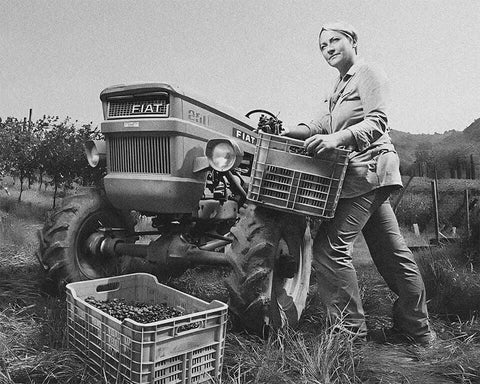Corvina, also known as Corvina Veronese, is a red Italian wine grape variety primarily grown in the Veneto region of northeastern Italy. It is crucial in producing notable wines like Amarone della Valpolicella and Valpolicella Ripasso.
Origin and History
Corvina has ancient roots in the Veneto region, particularly around Verona. Its cultivation dates back centuries, possibly to the 13th century. The name "Corvina" likely derives from "corvo," the Italian word for crow, referring to the grape's deep blue-black color.
Viticultural Characteristics
Corvina has thick skin and ripens late. It thrives in the hillside vineyards of Valpolicella, benefiting from the unique microclimate. The grape resists fungal diseases but can be drought-sensitive. Vines are often trained using the traditional pergola system to protect from sunburn and ensure even ripening.
Wine Characteristics
Wines from Corvina grapes are medium-bodied, with high acidity and moderate tannins. They often showcase sour cherries, cinnamon, and almonds. The appassimento process intensifies flavors in Amarone production, adding dried fruits, chocolate, and spices.
Key Wines
Corvina is the main grape in several renowned wines from Valpolicella:
- Valpolicella DOC: Light to medium-bodied red wine.
- Valpolicella Ripasso DOC: Fuller-bodied, refermented on Amarone grape skins.
- Amarone della Valpolicella DOCG: Powerful, full-bodied wine from partially dried grapes.
- Recioto della Valpolicella DOCG: Sweet dessert wine from dried grapes.
Winemaking Techniques
The appassimento technique, essential in many Corvina-based wines, involves partially drying grapes to concentrate sugars and flavors. Amarone and Recioto rely on this method. Valpolicella Ripasso involves refermenting basic Valpolicella on Amarone skins for added complexity.
Blending Partner
Corvina is often blended with Rondinella and Molinara, creating classic Valpolicella wines. Corvina adds acidity, aromatics, and resilience to appassimento, while other varieties contribute color, tannin, or softness.
Food Pairing
Corvina-based wines are versatile with food. Lighter Valpolicella pairs well with pasta and pizza, while robust Ripasso complements roasted meats and aged cheeses. Amarone, with its complexity, pairs well with rich dishes like braised meats or dark chocolate desserts.
Future Prospects
Corvina's future looks promising as wine enthusiasts seek unique, terroir-driven wines. Its ability to produce varied styles, from light and fresh to rich and complex, positions it well in the evolving wine market. The growing interest in traditional methods like appassimento further enhances its appeal.








